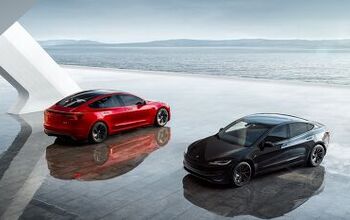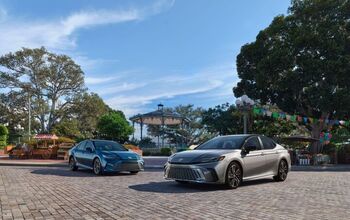Should 54.5 MPG Stay or Go? CAFE Crams for Midterms

As regulatory bigwigs gear up for a midterm review of corporate average fuel economy (CAFE) requirements, will the 54.5 mpg target for light-duty vehicles get a haircut, or be deemed too unambitious?
Under a 2012 agreement between the federal government and automakers, cars and light trucks will have until 2025 to meet the 54.5 mpg target, which works out to about 40 mpg on the window sticker (for cars) after you ditch the fancy math. That target isn’t set in stone, and the midterm review will take into account the state of the market — and existing technology — when it reviews its goals for the 2022-2025 period.
The first step of the review is the creation of a draft Technical Assessment Report (TAR), issued by the Environmental Protection Agency, National Highway Traffic Safety Administration and California Air Resources Board. That’s underway now, with the TAR due to be released for public comment this June.
A final determination and ruling will occur no later than April 1, 2018.
Even if the CAFE target is trimmed, automakers will face difficult decisions over how to achieve it. Fuel economy savings can be wrung out of a vehicle in many ways — electrification, weight-reducing measures, engine and transmission technology, computing and aerodynamics — but each measure comes with an added cost.
Ford Motor Company CEO Mark Fields has said he wants the review to deal in hard facts, calling the process “challenging.”
Fiat Chrysler Automobiles CEO Sergio Marchionne said last year that he expects “a relaxation of the timeline,” due to the drop in oil and gas prices.
Despite the willingness of automakers to produce vehicles that achieve CAFE targets, high-mileage vehicles often fail to resonate with buyers (and not just hybrid vehicles, which have seen sales sink in recent years).
Last year, a study by the Consumer Federation of America concluded that the 2025 target was doable, given recent advances by automakers.
[Sources: Automotive News, Wall Street Journal]

More by Steph Willems
Latest Car Reviews
Read moreLatest Product Reviews
Read moreRecent Comments
- Teddyc73 Oh good lord here we go again criticizing Cadillac for alphanumeric names. It's the same old tired ridiculous argument, and it makes absolutely no sense. Explain to me why alphanumeric names are fine for every other luxury brand....except Cadillac. What young well-off buyer is walking around thinking "Wow, Cadillac is a luxury brand but I thought they had interesting names?" No one. Cadillac's designations don't make sense? And other brands do? Come on.
- Flashindapan Emergency mid year refresh of all Cadillac models by graphing on plastic fenders and making them larger than anything from Stellantis or Ford.
- Bd2 Eh, the Dollar has held up well against most other currencies and the IRA is actually investing in critical industries, unlike the $6 Trillion in pandemic relief/stimulus which was just a cash giveaway (also rife with fraud).What Matt doesn't mention is that the price of fuel (particularly diesel) is higher relative to the price of oil due to US oil producers exporting records amount of oil and refiners exporting records amount of fuel. US refiners switched more and more production to diesel fuel, which lowers the supply of gas here (inflating prices). But shouldn't that mean low prices for diesel?Nope, as refiners are just exporting the diesel overseas, including to Mexico.
- Jor65756038 As owner of an Opel Ampera/Chevrolet Volt and a 1979 Chevy Malibu, I will certainly not buy trash like the Bolt or any SUV or crossover. If GM doesn´t offer a sedan, then I will buy german, sweedish, italian, asian, Tesla or whoever offers me a sedan. Not everybody like SUV´s or crossovers or is willing to buy one no matter what.
- Bd2 While Hyundai has enough models that offer a hybrid variant, problem has been inadequate supply, so this should help address that.In particular, US production of PHEVs will make them eligible for the tax credit.


































Comments
Join the conversation
The targets should be relaxed. They can be met however at a lot of added cost, most of which is passed on to the consumer. Most people don't make this connection and simply assume the rising cost of vehicles is due to inflation or being screwed. Nevermind consumer preference.
Arguing against freedom should be fatal. Wealth without the backing of a powerful state is no danger. This country has failed to educate its most vulnerably stupid.